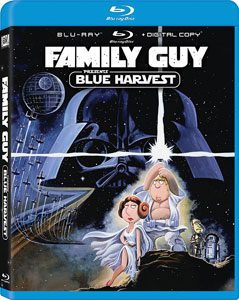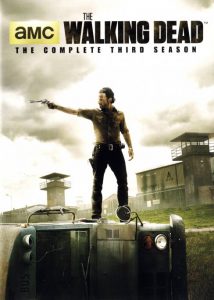I swung in for a sandwich at the local Jimmy John’s the other day, and as often happens, my chat with owner Jon Oja quickly switched from sandwiches to movies and TV. We both said we were looking forward to the “Walking Dead” Season 3 finale, and he mentioned he thinks the show is one of the best on TV … ever.
A simple enough bit of hyperbole, and one that comes up regularly when intelligent TV fans discuss good TV (and Jon has great taste — he’s lent me several good foreign films I wouldn’t have otherwise seen). But it stuck in my mind as I watched Sunday’s culmination of the Governor vs. Rick’s group arc. Although I’ve always watched and supported the show, it really hadn’t occurred to me before this: “The Walking Dead” does deserve to be in the mix of the all-time greats.
Granted, even Sunday’s episode — arguably the best of the series so far — has flaws, but these are the types of flaws you tend to think of the next day. Why is Andrea chatting with a dying Milton while the pliers is just sitting there? Why did the prison and Woodbury survivors settle in the prison rather than Woodbury? Didn’t it seem like there used to be more residents of Woodbury than we see in this episode? Weren’t the Governor and his two loyalists heading toward the prison for another shot at revenge at the end? I guess not, but that point is cleared up more so in the “Talking Dead” discussion than in the episode itself.
Then there are questions of character motivation, although these can be considered interesting talking points rather than flaws in the narrative. Throughout the entire series, Rick mistrusts every new person he meets. Now he’s letting all of Woodbury stay in his enclave. What new bit of information or experience sparks his new way of looking at things? We see Carl gun down a Woodbury boy in cold blood rather than risk trusting him; as recently as last week, Rick had considered sacrificing Michonne, and last season he was within a hair’s breadth of letting Randall die rather than risk trusting him. And now he has the gall to question his son for following his tenets?
Continuing to argue against the question of whether “The Walking Dead” is among the best shows ever, I’d say a handful of contemporary series are superior. I had “Parenthood,” “The Clone Wars” and “Bunheads” higher on my 2012 list. The first is a great primetime family soap, the second brought (god, I hate using the past tense here) “Star Wars” to life in its purest form on the small screen, and the third keeps the “Gilmore Girls” vibe alive with a unique small-town ballet-school setting.
These shows perfect old ideas, but “The Walking Dead” is arguably breaking new ground: It’s a science fiction show whose reality is both completely impossible and entirely believable, and this is the reason it deserves to be ranked among the best ever. The attention to detail lavished on every episode since the pilot is why each subsequent episode — regardless of its internal flaws — tends to build on what has come before and become the best episode up to that point. And this is remarkable because in the show’s slow-burning early days, in the back of my mind, I doubted the longevity of a zombie series (fans of the long-running “Walking Dead” comic book no doubt knew better).

I’m not saying “The Walking Dead” hasn’t — or can’t have — good character arcs. Andrea’s attempts to bridge the differences between the prison and Woodbury ultimately played out well, for example. I also enjoyed Merle’s redemption yarn last week. The idea of Rick’s most questionable ideals being passed on — in extreme form — to his son will no doubt be a gripping centerpiece of Season 4.
But what makes “The Walking Dead” great is that the threat of the zombies has never become comical or something to be dismissed. Sure, they are easier to kill now than in the beginning, but that’s entirely because our heroes (and even the villains — hats off to the walkers-meet-machine-guns sequence on Sunday) have learned how to kill them; it’s not because the walkers gradually became cartoons.
Furthermore, the world consistently looks like what you’d expect in a zombie apocalypse: Barren, with the detritus of a once-sprawling society scattered about, often with just enough walker extras shambling in the background to remind us why it’s dangerous to be on the move rather than holing up somewhere. But there’s also that ever-so-slight hint of beauty to an open traffic-free road, isn’t there?
Despite hardly ever addressing it through dialogue, the larger picture of this dystopia hangs over “The Walking Dead” like a shroud, and it makes every second of the show richer. How many more people are alive on the planet? Since we only see the perspective of Rick’s group, we don’t know. But we can extrapolate based on the number of survivors they’ve run across: the farmstead family, Randall’s gang, the surviving prisoners, Tyreese’s group, the random hitchhiker, and of course the Woodbury citizens.
I’d guess thousands, maybe hundreds of thousands (down from an Earth population of 7 billion), and it makes me imagine a Season 10 of “The Walking Dead” when the plague’s cure is found and we get to the phase of rebuilding civilization. Do we want to rebuild world governments like they used to be, or do we want to try something new?
When the notion that everyone becomes a walker upon death was introduced in Season 2, I thought it was somewhat hoary, for the sake of the shock of Shane being revived. Although I’m more patient than the average viewer (for example, I liked the first two seasons of “The Killing”), I’m accustomed to relatively quick explanations. But “The Walking Dead” isn’t afraid to let things simmer; it’s more than a year later and we are no closer to getting an answer to the mystery of how everyone is infected. We may never get an answer. Yet it certainly has upped the dramatic ante, as seen with the danger of Milton turning, and a bitten Andrea having to put a bullet to her head. The thematic side is just as juicy, as crystallized by the Governor’s twisted yet spot-on analysis of the new world: “You kill or you die — or you die and you kill.”
The specific scenario is unique to this piece of sci-fi, yet it has wider implications, stuff I think will be explored next year through the focal point of Carl. The individual parts of this show aren’t bad, but with the way it raises big questions without explicitly including them in a given script, “The Walking Dead” is exponentially better than the sum of its parts. And that’s why I can come to the curious conclusion that while a handful of current shows are superior, “The Walking Dead” truly does rank among the best shows ever.
Comments
![]() Mmmm … Jimmy Johns. I like how you always have a story or anecdote when you visit Jimmy Johns, while the only vibe I ever got was a mass lobotomy gone horribly wrong.
Mmmm … Jimmy Johns. I like how you always have a story or anecdote when you visit Jimmy Johns, while the only vibe I ever got was a mass lobotomy gone horribly wrong.
So, the “Waking Dead” … in the discussion for one of the best shows ever?
Eh, first thought is that I just don’t see it. At least not yet. Playing devil’s advocate, I’m going to deflect to a baseball analogy. When it comes to admission into Cooperstown, there are three schools of thought for voters: Those who look at the whole body of work, those who look at a measured level of continued dominance, and those who place a high value on a player’s career year or prime.
So in continuing with that comparison, where does “Walking Dead fit into that discussion? I’m not sure it does. Like you, it didn’t even make my top five shows of 2012 (hell, it didn’t make my top six). That should never be said about shows in their prime, and I’d never have said that with “Arrested Development” … “Buffy” …. “Breaking Bad … shows I considered can’t-miss, I’m-going-to-build-my-week-around. So we don’t have that continued dominance just yet or even that quintessential MVP season.
Yes, Season 3 killed it … along with a ton of main characters. While early, I’ll admit it will probably make my top 5 this year, but it will be well behind “Game of Thrones,” “Breaking Bad” and probably even “Comic Book Men.” Yeah, the show continues to break new ground on TV, but zombie flicks have long dominated the big screen and have blazed a well-worn path.
Maybe if the show takes the Craig Biggio path and continues to put up solid “numbers” I’ll put it into the discussion. But that talk should be sidelined for at least a season or two. Until then, I’ll just enjoy the show for what it is: Solid, must-see TV.# Posted By Seth Stringer | 4/25/13 11:00 AM
![]() For some reason, I hit it off with the local Jimmy John’s guys. … Can’t argue with your analysis. One factor that concerns me with “The Walking Dead” is re-watch value. I’ve never re-watched a single episode, and I fear I’d be bored. It has substance, but the substance is rather simple (in each episode), as opposed to being multi-layered on many of the all-time greats. However, it somehow has the same amount of overall substance as the greats, in the way it’s exploring life after civilization. And still having the walkers be scary and believable three seasons in is a feat. I think you are right: We’ll have to look at the stats at the end. Maybe it’ll take the Jim Rice path to the Hall of Fame. “Walking Dead” wouldn’t have made it if it had aired a decade earlier, but against a relatively weaker crop (in its sci-fi genre at least) of contemporaries, maybe it gets in when all is said and done.# Posted By John Hansen | 4/25/13 2:46 PM
For some reason, I hit it off with the local Jimmy John’s guys. … Can’t argue with your analysis. One factor that concerns me with “The Walking Dead” is re-watch value. I’ve never re-watched a single episode, and I fear I’d be bored. It has substance, but the substance is rather simple (in each episode), as opposed to being multi-layered on many of the all-time greats. However, it somehow has the same amount of overall substance as the greats, in the way it’s exploring life after civilization. And still having the walkers be scary and believable three seasons in is a feat. I think you are right: We’ll have to look at the stats at the end. Maybe it’ll take the Jim Rice path to the Hall of Fame. “Walking Dead” wouldn’t have made it if it had aired a decade earlier, but against a relatively weaker crop (in its sci-fi genre at least) of contemporaries, maybe it gets in when all is said and done.# Posted By John Hansen | 4/25/13 2:46 PM

